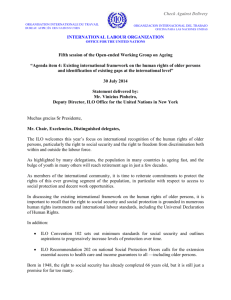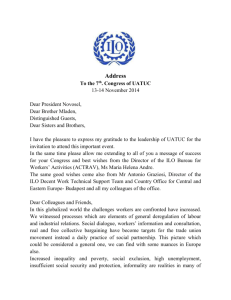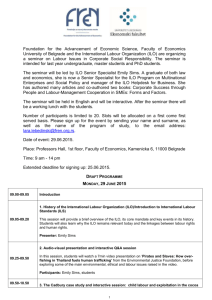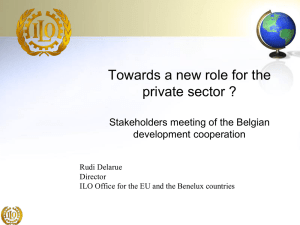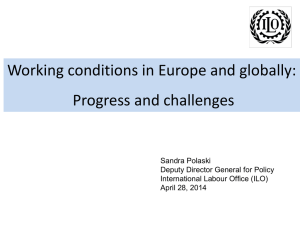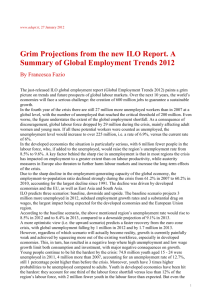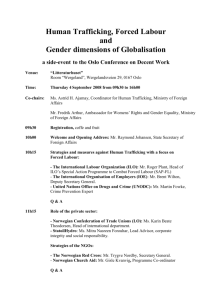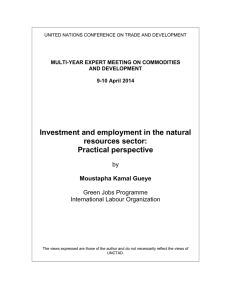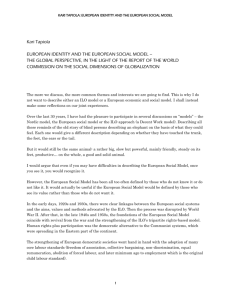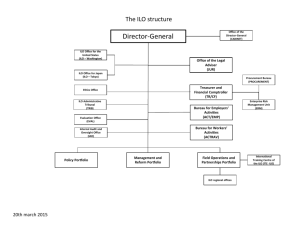Promoting growth and decent and productive employment: the ILO
advertisement
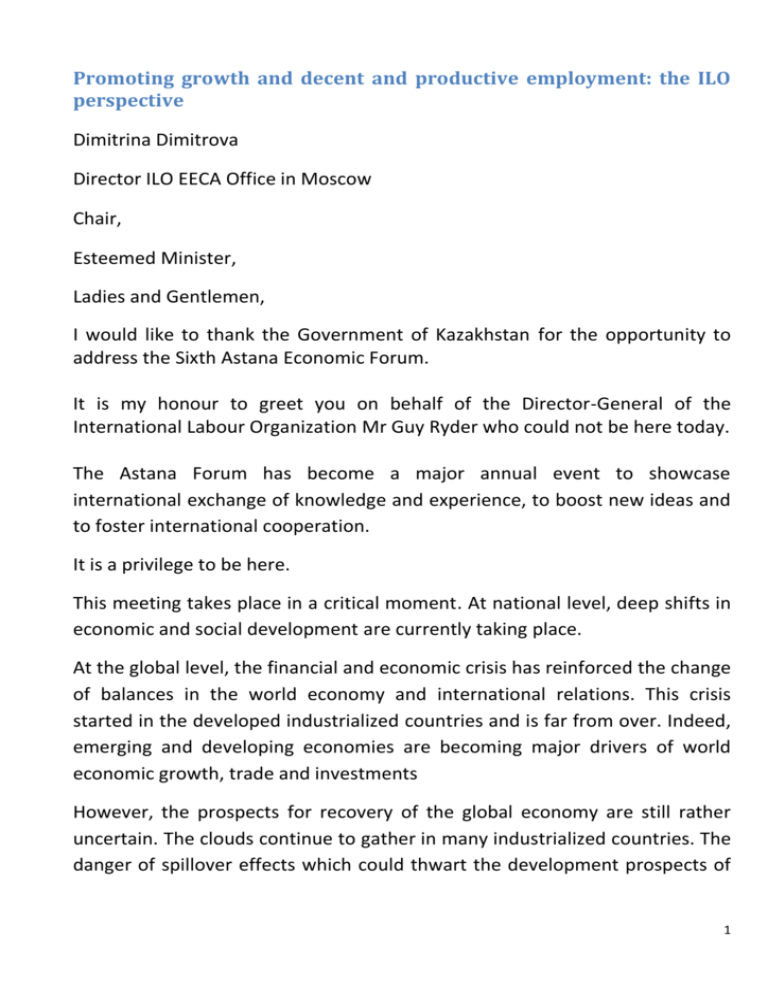
Promoting growth and decent and productive employment: the ILO perspective Dimitrina Dimitrova Director ILO EECA Office in Moscow Chair, Esteemed Minister, Ladies and Gentlemen, I would like to thank the Government of Kazakhstan for the opportunity to address the Sixth Astana Economic Forum. It is my honour to greet you on behalf of the Director-General of the International Labour Organization Mr Guy Ryder who could not be here today. The Astana Forum has become a major annual event to showcase international exchange of knowledge and experience, to boost new ideas and to foster international cooperation. It is a privilege to be here. This meeting takes place in a critical moment. At national level, deep shifts in economic and social development are currently taking place. At the global level, the financial and economic crisis has reinforced the change of balances in the world economy and international relations. This crisis started in the developed industrialized countries and is far from over. Indeed, emerging and developing economies are becoming major drivers of world economic growth, trade and investments However, the prospects for recovery of the global economy are still rather uncertain. The clouds continue to gather in many industrialized countries. The danger of spillover effects which could thwart the development prospects of 1 the emerging economies is persisting in due to the inbuilt economic inredependencies. Ladies and Gentlemen, While the global growth model developed over the last three decades may have served some countries well economically, it has also proven to be unbalanced, unfair and unsustainable. It has created inequalities, new environmental challenges and major decent work deficits including youth unemployment. If threatened social cohesion, political stability and long-term development in many countries. With its 94 years history in the world of work, the ILO reacted immediately and the Global Jobs Pact was adopted by the governments, employers and workers’ delegates of its Annual Conference in 2009. This action was guided by the sense of urgency as to the huge initial crisis’ effect on workers and business. Since then, in a consistent effort the ILO adopted a series of key document based on global tripartite consensus among which I will mention the Resolution on Youth Unemployment Crisis and the Recommendation on Social Protection Floor in 2012 as well as the Conclusions of the European Regional Meeting of 2013. Respected Colleagues, The global employment challenge is high and mounting. Entering now into the fifth year after its breakout, recovery is not around the corner. The just released ILO Global Employment Trends Report shows unemployment rates on the rise. Some 197 million people were without a job in 2012. Their numbers is predicted to rise further to 210 million, over the next five years. Compared to 2007, there are now over 28 million more unemployed people around the world. Close to 75 million young people worldwide are out of work, of which many have never had the chance to work. 2 Against the background of high income inequality inherited by the previous decade, falling demand coming with high unemployment and lack of consumers’ trust in the context of high uncertainly undermine further the prospects of economic recovery. The incidence of small business closing down is going up, especially small and medium size enterprises that have no access to credit. Big enterprises hold back their investment plans in the face if high uncertainly. Having examined the impact of the crisis on employment, the ILO Global Employment Trends Report 2013 finds that macroeconomic imbalances have been passed on to the labour market to a significant degree. It calls for decisive corrective policy action at national and international levels: 1. Better investment climate and job creation In order to create productive jobs private sector growth needs to be stimulated. This requires a climate which is investment- and consumptionfriendly. Among others, the Report calls for more coherent and predictable governments’ policy plans; implementation of financial reforms to restore the banking sector to its proper function of supporting investment and providing credit. Policy makers must focus on the mounting problem of youth unemployment. 2. Stimuli for global demand At present, high unemployment is putting downward pressure on real wages in many advanced economies, thereby lowering the support that private consumption could give to economic activity. Wage inequalities have to be addressed. The growing purchasing power of the middle class in emerging and many developing countries is a positive development that could increasingly become an important growth engine for the world economy, not immediately though. 3. Labour market mismatch and structural change 3 The length and depth of the labour market crisis is worsening labour market mismatch. Targeted educational and vocational training policies can help address this problem as part of a wider package of labour market policy mix of training and incentives that help workers quickly move to new job opportunities. 4. While the ILO does not hold the magic solution, it strongly advocates tripartite social dialogue between the government and independent trade unions and employers’ organizations as a means for find durable solutions in times of crisis. Social dialogue is good tool to share prosperity and even better means to respond in times of hardship and decline when positions of the parties tend to polarize. Colleagues, Since the eruption of the crisis in 2008, the ILO has been offering an analysis about policy options. No one size fits all solution exists. Owing to the diversity of national situations each country needs to find the policy mix which suits it best. I am certain that the Astana Forum 2013 will generate a fruitful exchange of experiences and help enhancing cooperation in the crisis ridden context. In its 2050 Strategy, Kazakhstan has come up with a long-term economic agenda and ambitious social objectives. This year we celebrate the 20th Anniversary of the country’s accession to the ILO. I look forward to the discussions during the Forum for inspirations in our continuous cooperation and joint efforts to tackle the major challenges of our day. Thank you. 4

